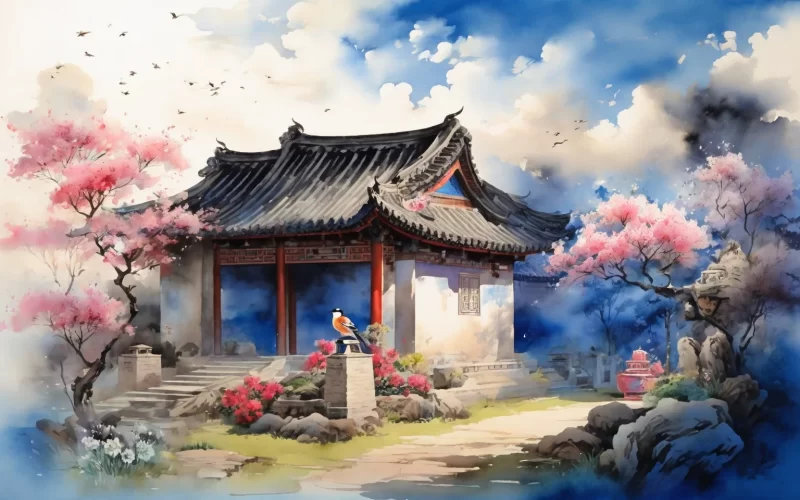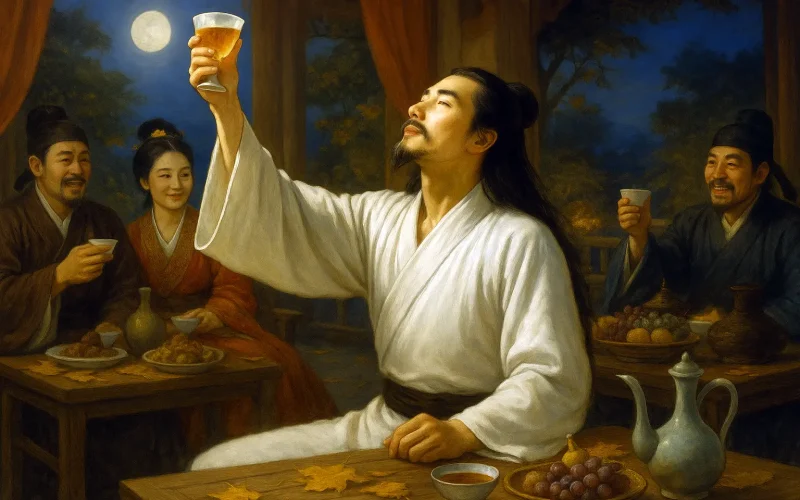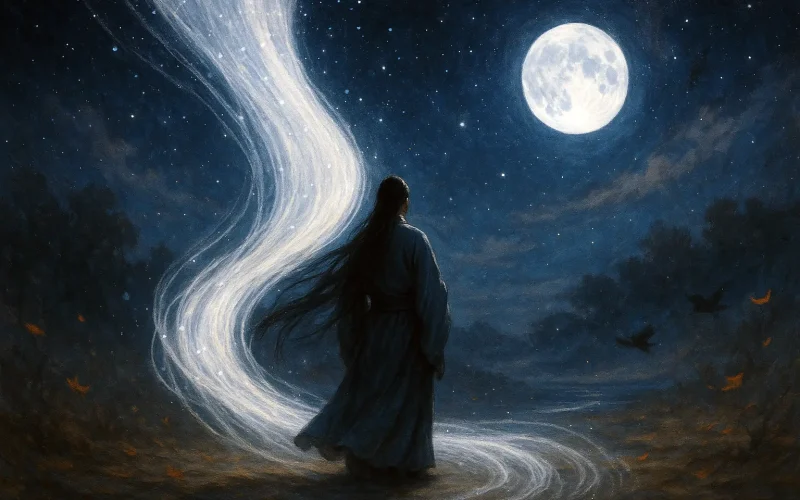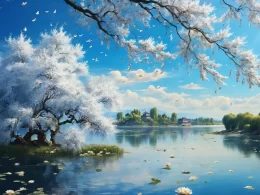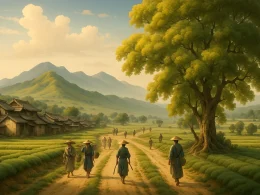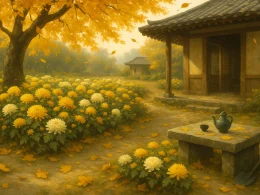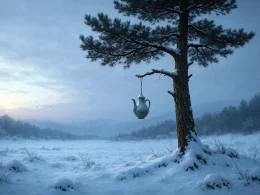Our life is but a dream,
Why should one toil in vain?
I’m therefore drunk all day
And lie prostrate at the porch.
Awake, I look at the courtyard green;
A bird sings amid flowers fair.
When I ask spring how old it is,
It says I am as old as my song.
I’d sigh, but soon I check my breath;
I drink my cup of wine instead.
I sing until the moon rises bright;
My song over, I forget the feeling.
Original Poem
「春日醉起言志」
李白
处世若大梦,胡为劳其生?
所以终日醉,颓然卧前楹。
觉来眄庭前,一鸟花间鸣。
借问此何时?春风语流莺。
感之欲叹息,对酒还自倾。
浩歌待明月,曲尽已忘情。
Interpretation
Composed after Li Bai's dismissal from court ("golden dismissal"), this work reflects profound soul-searching following his fall from political prominence. In 744 CE, the poet left Chang'an with spiritual wounds, his ideals of governance shattered. This poem typifies his later philosophy—beneath seemingly unrestrained drunkenness lies serious inquiry into life's value and resolute detachment from worldly pursuits.
First Couplet: "处世若大梦,胡为劳其生?"
Chǔshì ruò dà mèng, húwèi láo qí shēng?
Living in this world resembles a great dream; Why exhaust one's life in toil?
The opening establishes a philosophical tone with a fundamental question rooted in Zhuangzi's concept of life as an indistinguishable dream. This inquiry isn't nihilistic but challenges conventional values, stripping glory and wealth of their sanctity to reveal them as illusory scenes within the "great dream," providing philosophical justification for the ensuing drunkenness.
Second Couplet: "所以终日醉,颓然卧前楹。"
Suǒyǐ zhōngrì zuì, tuírán wò qián yíng.
Therefore I stay drunk all day, Slumped beneath the front pillars.
This couplet constitutes a behavioral corollary to the initial proposition. The conjunctive "Therefore" constructs definitive causal reasoning. His inebriation embodies a deliberate existential strategy—a conscious choice following comprehension of life's fundamental nature. The descriptor "slumped" simultaneously captures the physical manifestation of intoxication and symbolizes the wholesale rejection of worldly accomplishments, representing complete psychological emancipation.
Third Couplet: "觉来眄庭前,一鸟花间鸣。"
Jué lái miǎn tíng qián, yī niǎo huā jiān míng.
Waking, I gaze across the courtyard; A bird sings among flowering branches.
Perspective shifts from philosophical introspection to natural observation. "Gaze" conveys a casual, lethargic glance, perfectly continuing the "all-day drunk" state. The bird singing among flowers presents a scene of unconstrained, natural life—a reference point transcending human strife.
Fourth Couplet: "借问此何时?春风语流莺。"
Jièwèn cǐ hé shí? Chūnfēng yǔ liúyīng.
I ask: what season is this? Spring breeze converses with orioles.
This couplet brims with poetic vitality. Drunkenness makes him forget time, requiring inquiry to nature. The answer comes not from calendars but through the "conversation" between "spring breeze" and "orioles." This personification through synesthesia merges the poet completely into natural rhythms—he becomes a listening participant within nature, not mere observer.
Fifth Couplet: "感之欲叹息,对酒还自倾。"
Gǎn zhī yù tànxī, duì jiǔ hái zì qīng.
Moved, I almost sigh—then turn to pour myself more wine.
This reveals subtle yet profound inner conflict. "Almost sigh" is a natural emotional response to beauty, perhaps mixed with sorrow about his situation. But he abruptly checks this sentimental tendency, achieving self-redemption through "pour myself more wine." This shows his drunkenness isn't numbness but protection of the clarity just gained from nature.
Sixth Couplet: "浩歌待明月,曲尽已忘情。"
Hào gē dài míngyuè, qǔ jìn yǐ wàngqíng.
I sing wildly, awaiting the bright moon; The song ends, all worldly attachments forgotten.
The conclusion opens up magnificently, shifting from melancholy to transcendence. "Singing wildly" releases and elevates emotion; "awaiting the bright moon" ritualizes the action like a covenant with heaven's purity. The final "forgotten" state isn't indifference but the Daoist ideal of shedding physical and mental constraints to merge with the cosmic flow—a brief, pure spiritual freedom achieved through wine, song, and nature.
Holistic Appreciation
The poem constructs an exquisite emotional cycle of "drunkenness-sobriety-drunkenness," where the second drunkenness represents a new spiritual level. Beginning with philosophy, continuing with concrete intoxication, turning through natural epiphany, and culminating in spiritual freedom, it clearly shows how Li Bai poeticizes and livens Daoist philosophy through wine. The "spring" in the poem symbolizes not just a
a season but the awakening and joy of life's essence after casting off worldly bonds.
Artistic Merits
- Clear Philosophical Narrative: Following the logic of "thesis (life as dream) - practice (constant drunkenness) - verification (sober observation) - sublimation (singing away attachments)," it transforms abstract philosophy into tangible life experience.
- Dramatic Internal Conflict: The sudden turn between "almost sigh" and "pour more wine" creates dramatic tension, vividly portraying the poet's balance between indulgence and transcendence.
- Deep Human-Nature Fusion: The poet treats spring breeze and orioles as conversational partners, merging his emotion (forgetting attachments) with natural phenomena (moonrise), achieving Zhuangzi's forgetting of self and nature.
- Highly Condensed Language with Tension: Verbs like "slumped," "gaze," and "converses" are precise and expressive; the juxtaposition of "singing wildly" and "forgotten" creates powerful artistic tension between extreme expression and extreme peace.
Insights
This poem offers a model for rebuilding spiritual order in adversity. Li Bai's "drunkenness" is essentially active "detachment"—through a seemingly negative lifestyle (drinking), he successfully preserves his spiritual independence and purity. It enlightens us that when conflicting with external rules, we can seek inward to construct a spiritual homeland built on philosophy, art, and nature. True strength sometimes lies not in conquering environment but in having the courage and wisdom to choose a lifestyle that maintains distance while nurturing the soul. This "drunkenness" is poetic resistance against alienation and for preserving authenticity.
About the poet

Li Bai (李白), 701 - 762 A.D., whose ancestral home was in Gansu, was preceded by Li Guang, a general of the Han Dynasty. Tang poetry is one of the brightest constellations in the history of Chinese literature, and one of the brightest stars is Li Bai.






